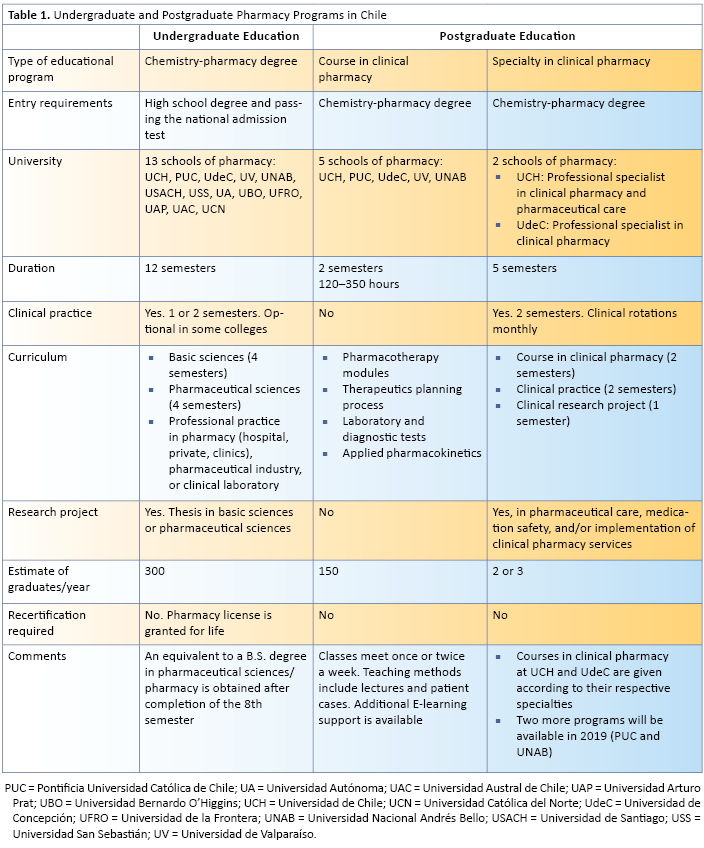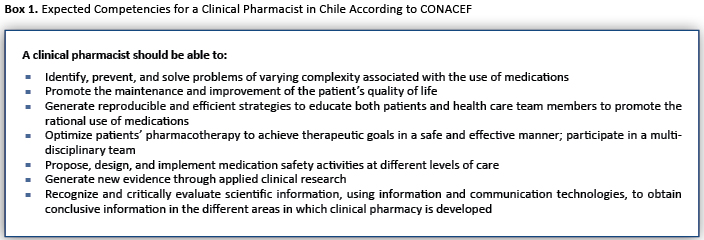In Chile, a pharmacist may carry the designation of “chemist-pharmacist” or “pharmacist.” To become a pharmacist, students must complete a 6-year college program known as “Chemistry and Pharmacy.” Thirteen schools of pharmacy offer this program, in which undergraduate and postgraduate study cannot be differentiated because of the program’s unified nature. After finishing this program, a pharmacy license is automatically granted, and there is no need to renew it throughout a pharmacist’s practice.
From its beginnings in 1846, this degree focused strongly on the basic sciences and pharmaceutical products. However, in the 1970s, clinical pharmacy education was added to the curriculum through lectures and internships in hospitals.1
Training and education in clinical pharmacy can be pursued by licensed pharmacists seeking to be specialized in this area. Currently, two 5-semester programs are offered by two schools of pharmacy (Table 1). Twenty clinical pharmacists (CPs) have obtained their specializations through these programs in the past 10 years.
Nevertheless, many other pharmacists have gained experience and clinical skills through clinical practice, postgraduate courses, or self-education. About 60 pharmacists currently work in different clinical areas, including intensive care units (ICUs), pediatrics, and infectious diseases, among others. Therefore, all pharmacists working with medical teams have adopted the title of CP. The ICUs have the most CPs, with about 40 pharmacists total.
Because more pharmacists are taking clinical roles, the Division of Clinical Pharmacy of the Chilean Society of Intensive Care Medicine (SOCHIMI) has been working on the “Crisol Project.” The aim is to develop national guidelines to standardize the work in ICUs regarding pharmacotherapy follow-up, medication safety, and registration of clinical activities.
In 2017, the Chilean Ministry of Health published a decree requiring CPs to become certified.2 Previously, this only applied to physicians and dentists. Now, there are two ways to become a certified CP specialist: complete a nationally accredited postgraduate training program (Table 1) or become certified by the National Autonomous Certification Corporation of Pharmaceutical Specialties (CONACEF).3 The last option is available for those who have been working as a CP for a set amount of years (currently in discussion) and who can demonstrate several competencies (Box 1). Their training would be deemed equivalent to the training of those completing a postgraduate training program.
Included among the many challenges throughout this process is the lack of involvement of an international pharmacy association with more experience in this area. Furthermore, the levels of clinical expertise among CPs vary significantly, which is expected, given that most of them gained experience on their own. Finally, the postgraduate training programs are quite new, and the time dedicated to clinical practice is quite limited (Table 1). It would be ideal to have accredited pharmacy residency programs, as in the United States, in order to improve CPs’ clinical training.
Regardless of these barriers, we believe these are the first steps to standardizing the practice of clinical pharmacy in Chile. We expect to have more certified CPs providing high-quality pharmaceutical services to our patients in the near future.


CONACEF = National Autonomous Certification Corporation of Pharmaceutical Specialties (CONACEF) in Chile.
Information from: Clinical Pharmacy Specialty, 2018. CONACEF: Corporación Nacional Autónoma de Certificación de Especialidades Farmacéuticas. Available at https://conacef.cl/farmacia-clinica. Accessed September 20, 2018.
- Ruiz I, Jirón M, Pinilla E, et al. Pharmaceutical care education at the University of Chile. Am J Pharm Educ 2003;66:144-7.
- Diario Oficial de la República de Chile. Modifica Decreto n° 8, de 2013, del Ministerio de Salud, reglamento de certificación de las especialidades de los prestadores individuales de salud y de las entidades que las otorgan. 27 diciembre. 2017;n° 41.944:1-3.
- Clinical Pharmacy Specialty, 2018. CONACEF: Corporación Nacional Autónoma de Certificación de Especialidades Farmacéuticas. Available at https://conacef.cl/farmacia-clinica. Accessed September 20, 2018.